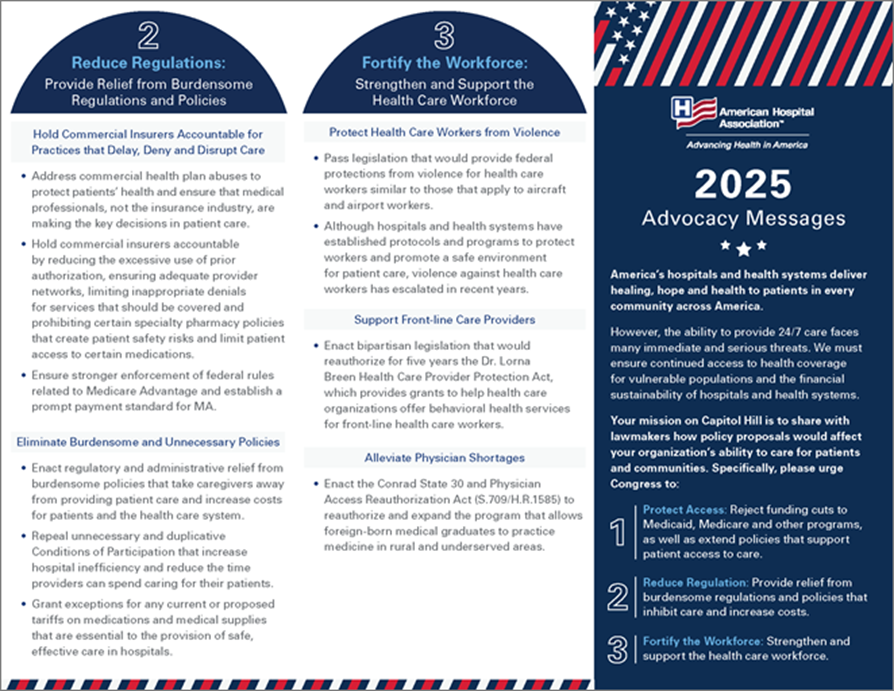Advisory
AHA Annual Membership Meeting 2025 Advocacy Messages Card
America’s hospitals and health systems deliver healing, hope and health to patients in every community across America.
However, the ability to provide 24/7 care faces many immediate and serious threats. We must ensure continued access to health coverage for vulnerable populations and the financial sustainability of hospitals and health systems.
Your mission on Capitol Hill is to share with lawmakers how policy proposals would affect your organization’s ability to care for patients and communities. Specifically, please urge Congress to:
- Protect Access: Reject funding cuts to Medicaid, Medicare and other programs, as well as extend policies that support patient access to care.
- Reduce Regulation: Provide relief from burdensome regulations and policies that inhibit care and increase costs.
- Fortify the Workforce: Strengthen and support the health care workforce.
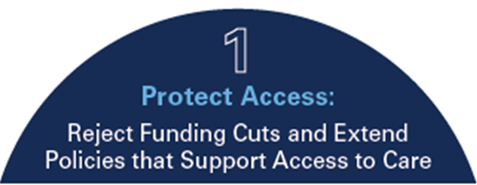
Reject Medicaid Cuts
- Reject billions of dollars in reductions to Medicaid that would strip access to health care from some of the most vulnerable populations and destabilize hospitals and health systems, leading to a loss of services that would impact communities nationwide.
- Medicaid is the largest single source of health care coverage in the U.S., covering more than 72 million Americans, including hardworking families, children, seniors, veterans and people with disabilities.
- Medicaid already pay hospitals less than the cost hospitals incur to provide care to Medicaid patients. In 2023, the difference between Medicaid payments and costs — the Medicaid shortfall — was $27.5 billion.
- The impact of cuts would not be limited to just Medicaid beneficiaries; it would stress the availability of health care services for everyone by forcing hospitals that serve disproportionately high rates of Medicaid and other public-payer patients to terminate services or close entirely.
- States could not absorb the magnitude of the proposed cuts by solely reducing enrollment or services for working adults — children, the disabled and the elderly would be negatively impacted.
Prevent So-called Site-neutral Payment Policies
- Oppose additional site-neutral payment cuts, which would reduce access to critical health care services, especially in rural and other underserved communities.
- Site-neutral payment policies would reduce access to critical health care services, especially in rural and other underserved communities.
- Site-neutral proposals fail to recognize that hospital outpatient departments treat sicker, lower-income Medicare patients with more complex and chronic conditions than those treated in independent physician offices or ambulatory surgery centers; maintain emergency standby services such as ICUs; and are held to stricter regulatory and safety requirements than other care sites.
- Medicare already severely underpays hospitals for the care they provide to patients; in 2022, Medicare paid 82 cents for every dollar hospitals spent caring for Medicare patients.
Extend the Enhanced Premium Tax Credits
- Extend the enhanced premium tax credits, which are set to expire at the end of the year, to help individuals and families purchase insurance on the health insurance marketplace.
- Tax credits helped millions of Americans purchase affordable commercial health care coverage. The expiration of this policy would effectively be a tax increase of $700 on average for millions of people across the nation.
- Allowing the EPTCs to expire would increase the number of uninsured people — disproportionately impacting rural states and those with lower incomes — and a $28 billion reduction in hospital spending over 10 years.
Protect the 340B Drug Pricing Program
- Protect the 340B program so it can continue to help providers stretch limited federal resources and provide more comprehensive services to more patients.
- 304B hospitals are the safety net for their communities. The program allows hospitals to reduce the price of outpatient pharmaceuticals for patients and expand health services to meet the needs of their communities.
- Drug companies continue to try to undermine the 340B program, including efforts to change the 340B program from an upfront discount to a back-end rebate model. This would jeopardize patients’ access to drugs, require financially strapped hospitals to provide upfront financing while they await reimbursement, and add considerable burden and cost to the health care system.
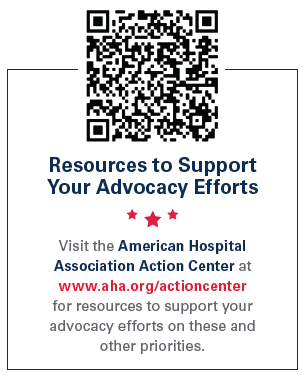
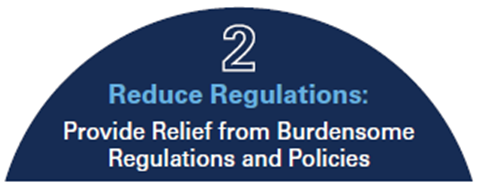
Hold Commercial Insurers Accountable for Practices that Delay, Deny and Disrupt Care
- Address commercial health plan abuses to protect patients’ health and ensure that medical professionals, not the insurance industry, are making the key decisions in patient care.
- Hold commercial insurers accountable by reducing the excessive use of prior authorization, ensuring adequate provider networks, limiting inappropriate denials for services that should be covered and prohibiting certain specialty pharmacy policies that create patient safety risks and limit patient access to certain medications.
- Ensure stronger enforcement of federal rules related to Medicare Advantage and establish a prompt payment standard for MA.
Eliminate Burdensome and Unnecessary Policies
- Enact regulatory and administrative relief from burdensome policies that take caregivers away from providing patient care and increase costs for patients and the health care system.
- Repeal unnecessary and duplicative Conditions of Participation that increase hospital inefficiency and reduce the time providers can spend caring for their patients.
- Grant exceptions for any current or proposed tariffs on medications and medical supplies that are essential to the provision of safe, effective care in hospitals.
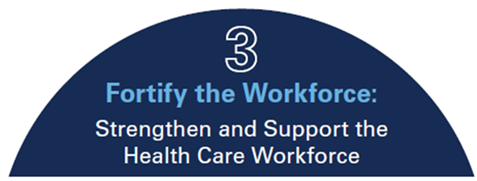
Protect Health Care Workers from Violence
- Pass legislation that would provide federal protections from violence for health care workers similar to those that apply to aircraft and airport workers.
- Although hospitals and health systems have established protocols and programs to protect workers and promote a safe environment for patient care, violence against health care workers has escalated in recent years.
Support Front-line Care Providers
- Enact bipartisan legislation that would reauthorize for five years the Dr. Lorna Breen Health Care Provider Protection Act, which provides grants to help health care organizations offer behavioral health services for front-line health care workers.
Alleviate Physician Shortages
- Enact the Conrad State 30 and Physician Access Reauthorization Act (S.709/H.R.1585) to reauthorize and expand the program that allows foreign-born medical graduates to practice medicine in rural and underserved areas.
Visit the American Hospital Association Action Center at www.aha.org/actioncenter for the latest action alerts, fact sheets, advocacy training and resources, congressional office information and more.


